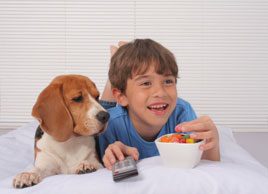10 things you should never feed your pet
Most pet owners know that chocolate is toxic for cats and dogs, but there are other foods that could harm them. Here are 10 foods that are harmful to pets

Source: Best Health Magazine, November 2011
1. Grapes, raisins and currants can be dangerous for your pets. ‘Even a small amount’just one’can cause acute kidney failure in cats and dogs,’ says Dr. Lloyd Keddie, president of the Canadian Veterinary Medical Association.
2. Raw food poses a risk for salmonella and E. coli bacteria. This is of particular concern if you have small children, or live with seniors or others with a weakened immune system, because the bacteria can be transferred from animals to humans (and vice versa).
3. Onions, chives and garlic can cause anemia’low red blood cells’in cats and dogs. But if your pet consumes only a small amount and is treated early, any damage to the blood cells is usually reversible.
4. Alcoholic drinks, such as beer, wine and spirits, have the same effect on pets as they do on us, including dizziness, lack of coordination and even alcohol poisoning.
5. Yeast dough can expand inside a pet’s stomach, stretching the abdomen and causing severe pain. And if it ferments, the yeast could cause alcohol poisoning.
6. Chicken bones splinter when they break, and the shards of bone could get lodged and puncture your pet’s larynx, esophagus or stomach.
7. Gum, breath mints and toothpaste that contain xylitol (a sugar substitute) cause dogs to release excess insulin, resulting in low blood sugar. ‘A small amount can have severe side effects such as weakness and even seizures,’ says Keddie. It doesn’t seem to bother cats, but keep foods with xylitol out of reach for both dogs and cats, just to be safe.
8. Some meats, such as fish and beef, contain a protein that can cause itchy skin conditions in cats who are allergic to it. For some dogs, the issue is animal fat; it can induce pancreatitis, which is indicated by lack of appetite, frequent vomiting and abdominal tenderness.
9. Coffee, tea, pop and other foods and drinks that contain caffeine increase heart rate and anxiety in cats and dogs.
10. Macadamia nuts can cause weakness, depression, vomiting and tremors in dogs.
How do you keep pets safe from food-related illness?
Store these items out of reach, and be sure that garbage and compost is always in a secure container. And don’t leave your purse on the floor; it could have gum or snacks that your pet will inevitably sniff out.
If you suspect your pet has eaten something harmful, call your vet immediately. Have as much information ready as you can, including what and how much was eaten, and the normal weight of your pet.
This article was originally titled "What not to feed your pet" in the November 2011 issue of Best Health. Subscribe today to get the full Best Health experience’and never miss an issue!




